|
Charles Dickens: The Life of the Author
The Young Dickens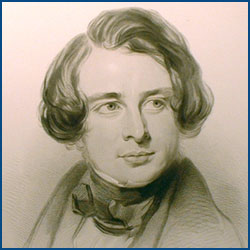 Dickens, after the 1838 drawing in chalk by Samuel Laurence. NYPL, Berg Collection St. Giles's was viewed "with sentiments of satisfaction" and, one infers, edification all around, but shortly afterwards, on the Strand (a well-known street in London), Dickens somehow became separated from his companion. At first, he was horrified; but he soon rallied and determined to set off to seek his fortune. "Thus I wandered about the City, like a child in a dream," he reminisced in "Gone Astray," an elegiac essay written more than thirty years later, "staring at the British merchants, and inspired by a mighty faith in the marvellousness of everything." 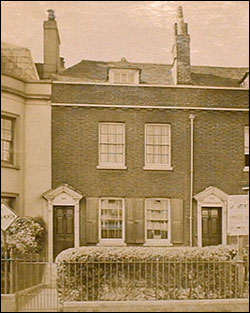 Dickens's birthplace at No.1 Mile End Terrace, Landport, a district on the outskirts of Portsmouth. NYPL, Berg Collection Looking back on his own childhood, Dickens saw "a very small and not over-particularly-taken-care-of boy." That very boy grew into a young man who, through the sheer fertility of his creative genius and an astonishing amount of hard work, transformed himself into the most famous writer of his age. In April 1856, Dickens wrote to his friend and future biographer John Forster of how clear it was to him that "one is driven by irresistible might until the journey is worked out!" His own mighty journey began in the English seaport of Portsmouth. On Friday, February 7, 1812, the second child and eldest son of Elizabeth and John Dickens was born, and was christened Charles John Huffam Dickens. The Dickens family 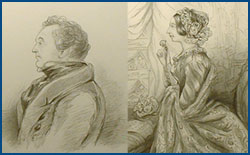 Elizabeth Dickens (1789-1863), Charles Dickens's parents. NYPL, Berg Collection Dickens's childhood was a sorry mixture of the fondly remembered and the wholly detested. The Dickens family was both large and almost always hard-pressed. In the profoundly autobiographical David Copperfield, the ever-pinched Mr. Micawber gives David some shrewd advice: "Annual income twenty pounds, annual expenditure nineteen nineteen six, result happiness. Annual income twenty pounds, annual expenditure twenty pounds ought and six, result misery." And yet, like Dickens's father, Mr. Micawber remains ever hopeful--"In case anything turned up" is indeed his favorite expression. A troubled youth
Rambling about the beautiful countryside one day, young Dickens and his father came upon a handsome country house, Gad's Hill Place, which stood on a high spot of ground on the main road between Rochester and Gravesend. This "wonderful mansion," which basked in a glorious Shakespearean glow (it is the very spot where Falstaff, in Henry IV, Part I, relieves the travelers of their treasure), became a sort of childhood dream for Dickens. His father told him: "If you were to be very persevering, and were to work hard, you might some day come to live in it." (For once, John Dickens proved prescient. In 1856, Charles Dickens would purchase the "stupendous property" that had so enchanted him as a child, and take possession of it early the next year; and in 1860, the wandering novelist, whom one observer described as the "veriest vagabond," would settle there permanently.) 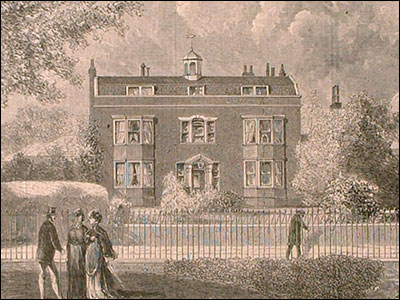 A view of Dickens's beloved home in Kent, Gad's Hill Place, which he had dreamed of owning as a child. This engraving was published in the American magazine Every Saturday: An Illustrated Journal of Choice Reading, April 9, 1870. An accompanying article describes Gad's Hill as "one of those comfortable old-fashioned mansions which seem to have taken root nowhere but in the most picturesque parts of rural England, and are the brick-and-mortar embodiment of the idea of home." This issue of Every Saturday also featured the first installment of Dickens's final work, The Mystery of Edwin Drood. NYPL, Print Collection The Chatham idyll ended abruptly when John Dickens was transferred to London in 1822, a move that in no way inspired him to remedy the ill management of his affairs, which continued to bring terrible strains upon the household and creditors to the door. By early 1824, the house of cards was about to collapse. In early February, only a few days after his twelfth birthday, young Charles was sent to work pasting labels on bottles at a tumbledown, rat-overrun shoe polish factory on the Thames. Pay was six shillings a week, hours 8 a.m. to 8 p.m. "It is wonderful to me," he would later write of this catastrophe, "how I could have been so easily cast away at such an age."
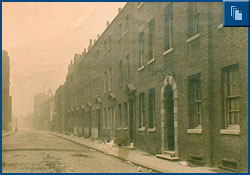 the young Dickens, including this photograph of the house in Lant Street, London, where he lived while his father was in debtor's prison. NYPL, Berg Collection But worse was to come when, on February 20, John Dickens was arrested for debt, and soon after the entire family (except for Charles and his older sister Fanny, who was studying at the Royal Academy of Music) joined him in the Marshalsea debtor's prison. Each evening, young Charles returned alone to his lodgings in Camden Town, a three-mile walk from Warren's Blacking factory. These cruel turns of fate--his humiliating enslavement to menial labor and his father's imprisonment and disgrace--would haunt Dickens for the remainder of his life. Abandoned children and orphans like Pip--the hero of Great Expectations (1860-61; 1861)--are everywhere in his work, and abandonment of course need not be literal to wound deeply and permanently. Declared insolvent in late May, John Dickens was released from prison; and eventually he removed his son from the blacking factory and placed him again in school. But Elizabeth Dickens could not comprehend why he should be removed from a situation of gainful employment--and for her son, this was a bitter betrayal. "I never afterwards forgot," Dickens would write years later, in an autobiographical fragment that was not published until after his death, "I never can forget, that my mother was warm for sending me back." 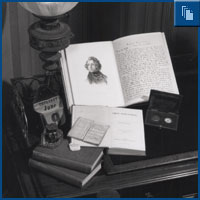 The New York Public Library's Berg Collection, including a mahogany writing table and brass lamp from Gad's Hill Place. The card calendar, in the tin box, is stopped on June 9, the day of the great man's death in 1870. NYPL, Berg Collection By all accounts, Dickens was a remarkably sensitive child, and this awful period of "humiliation and neglect" marked him indelibly. Even at the height of his fame, he would forget himself in his dreams, and, as he said, "wander desolately back to that time of my life." The Bostonian Annie Fields, the wife of Dickens's American publisher and one of the most perceptive admirers of both the public and the private man, frequently enjoyed the novelist's companionship during his second triumphant tour of North America (November 1867-April 1868). After one such evening she wrote in her diary, "Such charity! Poor man! He must have learned great need for that ... He is a man who has suffered, evidently ..." |
||||||||||||